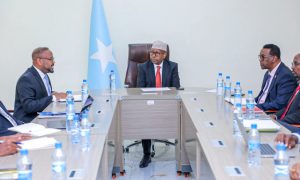

September 15, 2015 The U.S. Court of Appeals for the Fourth Circuit will hear oral arguments on Wednesday over whether to uphold dismissal of human rights abuse claims brought under the Alien Tort Statute against Colonel Yusuf Abdi Ali, who controlled a region in northern Somalia during the regime of military dictator Mohamed Siad Barré in the 1980s. The panel will be the first appeals court to decide whether the U.S. Supreme Court’s 2013 decision in Kiobel v. Royal Dutch Petroleum, which limited use of the Alien Tort Statute, grants safe harbor in the United States to individuals accused of mass atrocities, said Kathy Roberts, legal director of the Center for Justice and Accountability.
Roberts (left), who is representing a victim claiming abuse by Ali, spoke with The National Law Journal about the case. Ali’s attorney, Joseph Peter Drennan, a solo practitioner in Alexandria, Virginia, did not respond to a request for comment.
This story is edited for length and clarity.
The National Law Journal: What happened to your client, Farhan Warfaa?
Kathy Roberts: Our client was a very young man at the time when all the men and boys in his village were gathered by Colonel Ali’s men, taken to headquarters, tortured and questioned and treated very brutally. Colonel Ali shot him at point blank range five times. Colonel Ali thought he was dead and told his men to get rid of him. Our client, Mr. Warfaa, miraculously survived.
Colonel Ali was in the United States for military training when the Siad Barré regime fell. He fled to Canada. He was eventually deported from Canada on suspicion of being a war criminal back to the United States. He’s been allowed to live here openly since 1996.
NLJ: The appeal involves dismissal of claims under the Alien Tort Statute but not the Torture Victim Protection Act of 1991, both of which are often cited in cases over human rights abuse in foreign countries. What’s the difference for your client?
KR: It’s about whether or not he can bring mass atrocity claims—the claims that are not just torture and extrajudicial killings—but that they were part of a crime against humanity, a systematic or widespread attack against a civilian population. When I asked him whether he wanted to appeal, he said he wanted Colonel Ali to be held responsible for all the crimes he committed, and not only for the isolated crimes committed against him.
NLJ: Your argument focuses on a portion of Kiobel that exempts claims that “touch and concern” the United States. Why do you think your case fits this description?
KR: The Supreme Court’s recent decision in Kiobel allows you to bring claims overseas for violations of international law but you also have to demonstrate some sort of connection or interest with the United States. We think we have a very strong argument that the United States has an interest in not becoming a safe harbor for foreign perpetrators of international crimes.
NLJ: Colonel Ali also wants dismissal based on immunity claims. You overcame a similar argument before the Fourth Circuit in a case against Somalia’s former prime minister, Mohamed Ali Samantar. Talk about this case.
KR: Immunity is something granted to the government as a matter of comity, not a matter of individual right. On top of that, even if the government is seeking immunity, such a low level person is not generally entitled under international law to immunity protection. Third, and the strongest argument, is the Fourth Circuit has said it’s no official act when you commit the types of crimes that Colonel Ali committed. This is already governed by Fourth Circuit law, so feel confident that our client should prevail on the immunity claim.
.
Source: Nationallawjournal
Contact Amanda Bronstad at abronstad@alm.com.
_____________________________________________________________________________________
Xafiiska Wararka Qaranimo Online | Mogadishu, Somalia
_____________________________________________________________________________________Advertisement
_____________________________________________________________________________________






